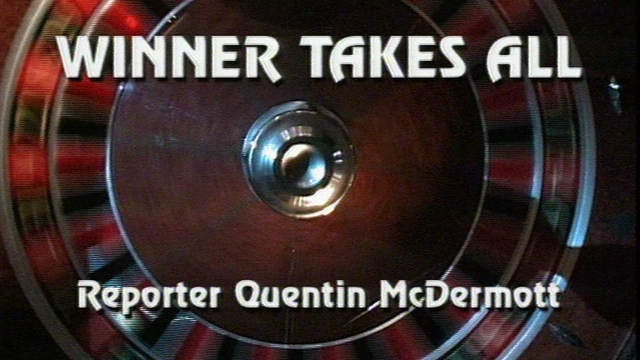Winner Takes All
We explore the unhealthy relationship between gambling and society.
 Gambling is big business in Australia. Here - like everywhere else in the world - it is growing at an astonishing rate. Estimated to be worth $95 billion dollars, the industry thrives on robbing normal people of their hard-earned money. All sorts are seduced by the bright lights of Las Vegas and dreams of fast and easy money.
Gambling is big business in Australia. Here - like everywhere else in the world - it is growing at an astonishing rate. Estimated to be worth $95 billion dollars, the industry thrives on robbing normal people of their hard-earned money. All sorts are seduced by the bright lights of Las Vegas and dreams of fast and easy money.
Veronica Sloane, a hotel manager, paints the picture: "the punters are like chickens at little feeding pens, all doing the thing at the same time of day, all pecking at the machines, thinking that this is life." The problem is they don't know when to stop.
Casinos are breeding grounds for vices including prostitution and loan sharking. Among the glitzy disco lights and surrounded by the tinkering noise of money running through game machines, prostitutes ply their trade. Business is good here because men are out to have "a good time". Loan sharks from the criminal underworld target desperate losers craving for another fix. They lend people money and draw them deeper and deeper into debt. The standard loan rate increases by 10% per week and one high roller remarks: "If you didn't repay it, there were threats of violence against you."
The seedy side of gambling is that it invariably attracts dirty money. The casinos deny this. But the simple truth is that they are not concerned who you are or where your money came from - as long as you have it and are prepared to play it. And the bigger the spender the better. A high roller is known as a 'whale', someone who is prepared to fork out a great deal of money on a night out. Whales get special treatment. "They get what they want. Be that alcohol, rooms, food, service, whatever", one high roller tells us. Casinos even go so far as to consciously target ethnic minorities, especially Vietnamese, because they are known to be strong gamblers. One unsavoury character, Van Duong, was a "big layer" in gambling terms. In a six-month period he bet $94 million - very big money for a barbecue duck restaurateur. Then Van Duong was exposed as a big time heroin dealer and jailed for eight years.
The government is aware of the dirty business and could enforce the law to revoke gambling licenses. But a clamp-down on gambling would mean writing off millions gained from tax revenues. Such calculations offer little comfort to the victims of the gambling craze. Karen Richardson lost her husband Gavin tragically when he took his own life. Gavin had a bad gambling habit costing him $1000 a week and finally amounting to a debt of $125 000. Left behind to raise her teenage children on her own, Karen says: "The industry is just set up to suck people in, and to get them coming back."
The prospects for tighter controls on gambling in the future look slim. In fact, some trends point in opposite direction. With the coming of the internet age many predict a massive expansion in online gambling. As the Reverend Tim Costello points out: "The virtual casino will see many people losing their homes without even leaving their homes."
Produced by ABC Australia
FULL SYNOPSIS
